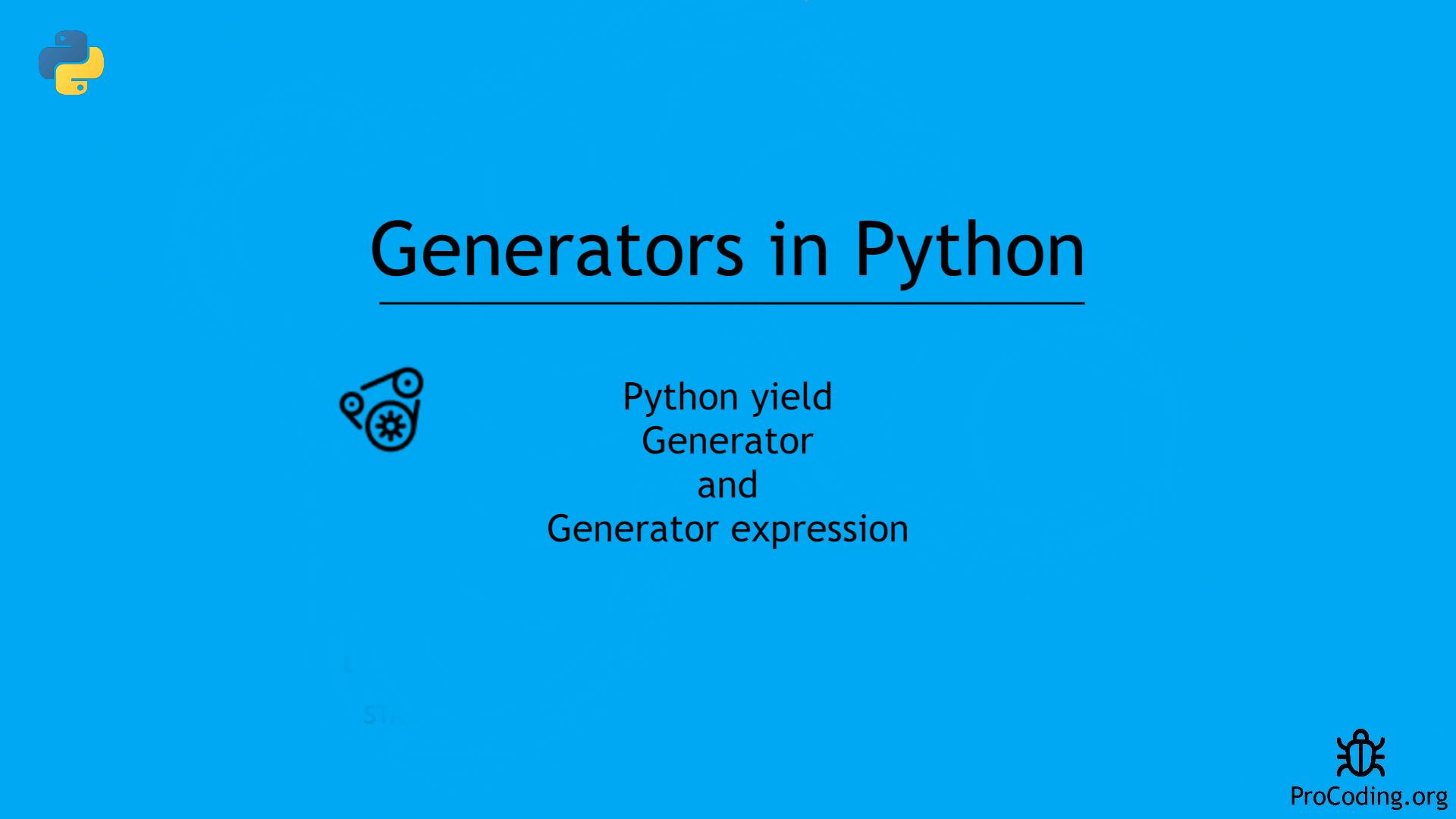Generators in python: How to use Generators and yield in Python
A generator is a function which is responsible to generate a sequence of values. It can be written like a regular function, but it uses the yield keyword.

Table of contents
- Generators in Python
- Writing Generators
- Python Generator with loop
- Creating list using generator function
- Python Generator Expression
- Performance comparision of Generator with Other Collection
- When I should choose Generator?
- Advantages of using Generator function
Generators in Python
Generator is a function that returns an object(iterator) which can be used to get one value at a time.
We can achieve same functionality using iterators also but it is a lengthy process because we have to write __iter__() and __next__() then raise StopIteration exception.
Writing Generators
Generators are very much similar to function but we use yield instead of return statement.
We can use any number of yield statement in a generator function.
return statement terminates the function and controll is passed back to calling function completely. But yield statement pauses the function and save its state as well as local variables and continues the execution from that state.
After execution of generator StopIteration is raised automatically.
def generator():
yield 'a'
yield 'b'
yield 'c'
g = generator()
print(type(g))
print(next(g))
print(next(g))
print(next(g))
print(next(g))
Output -
<class 'generator'>
a
b
c
Traceback (most recent call last):
File "demo.py", line 12, in <module>
print(next(g))
StopIteration
In the example given below you can observe how generator function remembers the state of its local variables.
def generator():
num = 1
yield num
num = num + 1
yield num
num = num + 1
yield num
g = generator()
print(next(g))
print(next(g))
print(next(g))
print(next(g))
Output -
1
2
3
Traceback (most recent call last):
File "demo.py", line 16, in <module>
print(next(g))
StopIteration
Python Generator with loop
Since, generator uses iterator behind the scene we can use for loop that takes an iterator and iterate over it using next() function and stops the execution when StopIteration exception is raised.
def generator():
num = 1
yield num
num = num + 1
yield num
num = num + 1
yield num
for num in generator():
print(num)
Output -
1
2
3
Better way to use generator with loop is given below.
Example 1:
def firstN(num):
n = 1
while n <= num:
yield n
n = n + 1
for num in firstN(5):
print(num)
Output -
1
2
3
4
5
Example 2:
def str_rev(my_str):
length = len(my_str)
for i in range(length - 1, -1, -1):
yield my_str[i]
for char in str_rev("hello"):
print(char)
Output -
o
l
l
e
h
Creating list using generator function
def firstN(num):
n = 1
while n <= num:
yield n
n = n + 1
data = list(firstN(5))
print(data)
Output -
[1, 2, 3, 4, 5]
Python Generator Expression
In Python, there is a one-liner to create generators which is very much similar to list comprehension.
We have to use round brackets instead of square brackets to create generator evertything else is similar to List comprehension.
Example: Square of numbers using generator Expression
nums = [2, 3, 4, 5, 6]
square_num = (x**2 for x in nums)
print(square_num)
for num in square_num:
print(num)
Output -
<generator object <genexpr> at 0x000001DF097DCF10>
4
9
16
25
36
Performance comparision of Generator with Other Collection
If we compare the performance of generator with other data structure there is a huge difference because data structures performs all tha calculation first and store complete result in the begining but generator performs each operation when it is required and yield the result one by one.
Observe the following example.
import random
import time
alpha = ['a', 'b', 'c', 'd', 'e']
nums = [1, 2, 3, 4, 5]
def combination_list(num):
result = []
for i in range(num):
data = {
'id': i,
'alpha': random.choice(alpha),
'num': random.choice(nums)
}
result.append(data)
return result
def combination_generator(num):
for i in range(num):
data = {
'id': i,
'alpha': random.choice(alpha),
'num': random.choice(nums)
}
yield data
t1 = time.clock()
result = combination_list(1000000)
t2 = time.clock()
t3 = time.clock()
result = combination_generator(1000000)
t4 = time.clock()
print('List', t2-t1)
print('Generator', t4-t3)
Output -
List 2.7044390000000003
Generator 0.12968809999999964
When I should choose Generator?
- While reading large files e.g., csv or excel files which may lead into
MemoryErrorif common data structure is used. - When you have to generate an infinite sequence.
Advantages of using Generator function
- Generators are easy to use if compared with class level iterators.
- Improves memory utilization and performance.
- Best suitable for reading data from large files.
- Generators works great for web scraping and crawling.